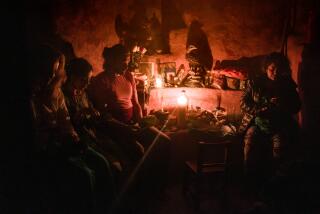Religious Use of Drug Will Be Argued : U.S. High Court OKs Hearing Case Under First Amendment
- Share via
WASHINGTON — The Supreme Court agreed today to decide if the religious use of the hallucinogenic drug peyote is protected by the First Amendment’s guarantee of freedom of religion.
The court will hear arguments next term in the case brought by Oregon seeking review of state court rulings.
This is the court’s second look at the case that involved two American Indian drug abuse counselors who sought unemployment benefits after being fired for using peyote.
The case originally came before the court in 1987. It involved Alfred Smith, a Klamath Indian and a member of the Native American Church, and Galen Black, also a member of the church. The two, drug counselors employed by the Douglas County Council on Alcohol and Drug Abuse Prevention and Treatment, were fired for eating peyote, a cactus button containing the hallucinogen mescaline, which is illegal in Oregon.
The drug is used by members of the Native American Church as part of a religious ceremony that lasts from sundown Saturday to sunrise Sunday.
As part of their employment with the council, both men agreed to avoid all substance abuse. However, both ingested peyote at religious ceremonies in 1983 and 1984 and were fired from their jobs.
They applied for unemployment benefits and they were approved, based on a ruling that they were not fired for good cause but because of their religious beliefs in violation of constitutional rights to freedom of religion. The granting of unemployment rights was upheld in state courts.
However, the state brought the case to the Supreme Court, which, in April, 1988, refused to decide whether the Constitution reached the issue and, on a 5-3 vote, sent the case back to state court.
The Oregon Supreme Court ruled that state law did not exempt the religious use of peyote from drug laws, but added that the “outright prohibition of good faith religious use of peyote by adult members of the Native American Church would violate the First Amendment directly.” The court also ordered the payment of unemployment benefits.
Again seeking high court review, the state said the decision is “wrong, its analysis is shallow, and the ramifications of its holding are far-reaching.”
In other action, the court:
* Denied the appeal of William Bonin, the “freeway killer” who was sentenced to death in California after being convicted of murdering 14 young men between 1979 and 1980.
* Refused to revive a libel lawsuit against the Los Angeles Times by a naval commander court-martialed in 1984 after his ship ran aground in Hawaii. The justices, citing a lack of jurisdiction, left intact California court decisions dismissing Cmdr. Willard G. (Bud) Chrisman’s suit that alleged seven Times articles ruined his Navy career.
More to Read
Sign up for Essential California
The most important California stories and recommendations in your inbox every morning.
You may occasionally receive promotional content from the Los Angeles Times.













